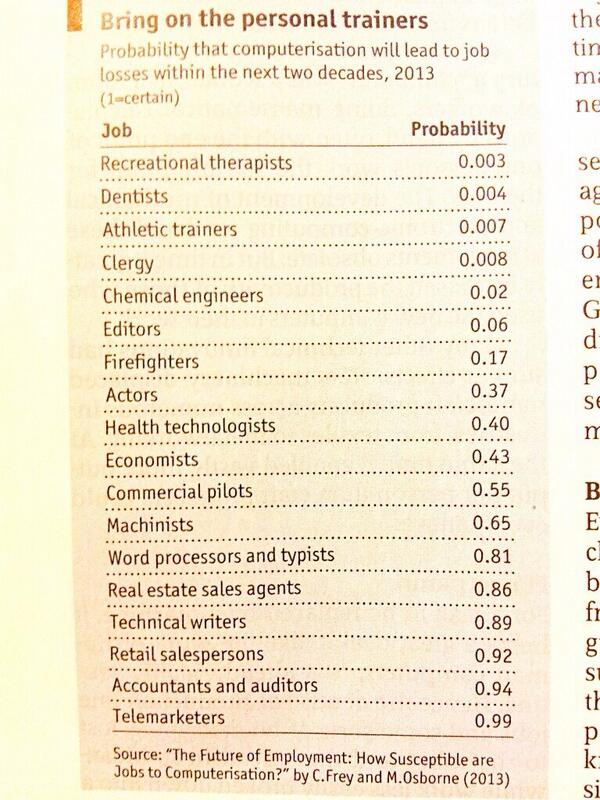Probability that computers will take away your job posted by Jure Leskovec.

For your further amusement, I recommend the full study, “The Future of Employment: How Susceptible are Jobs to Computerisation?” by C. Frey and M. Osborne (2013).
The lower the number, the less likely for computer replacement:
- Logisticians – #55, more replaceable than Rehabilitation Counselors at #47.
- Computer and Information Research Scientists – #69, more replaceable than Public Relations and Fundraising Managers at #67. (Sorry Don.)
- Astronomers – #128, more replaceable than Credit Counselors at #126.
- Dancers – #179? I’m not sure the authors have even seen Paula Abdul dance.
- Computer Programmers – #293, more replaceable than Historians at #283.
- Bartenders – #422. Have you ever told a sad story to a coin-operated vending machine?
- Barbers – #439. Admittedly I only see barbers at a distance but if I wanted one, I would prefer human one.
- Technical Writers – #526. The #1 reason why technical documentation is so poor. Technical writers are under appreciated and treated like crap. Good technical writing should be less replaceable by computers than Lodging Managers at #12.
- Tax Examiners and Collectors, and Revenue Agents – #586. Stop cheering so loudly. You are frightening other cube dwellers.
- Umpires, Referees, and Other Sports Officials – 684. Now cheer loudly! 😉
If the results strike you as odd, consider this partial description of the approach taken to determine if a job could be taken over by a computer:
First, together with a group of ML researchers, we subjectively hand-labelled 70 occupations, assigning 1 if automatable, and 0 if not. For our subjective assessments, we draw upon a workshop held at the Oxford University Engineering Sciences Department, examining the automatability of a wide range of tasks. Our label assignments were based on eyeballing the O∗NET tasks and job description of each occupation. This information is particular to each occupation, as opposed to standardised across different jobs. The hand-labelling of the occupations was made by answering the question “Can the tasks of this job be sufficiently specified, conditional on the availability of big data, to be performed by state of the art computer-controlled equipment”. Thus, we only assigned a 1 to fully automatable occupations, where we considered all tasks to be automatable. To the best of our knowledge, we considered the possibility of task simplification, possibly allowing some currently non-automatable tasks to be automated. Labels were assigned only to the occupations about which we were most confident. (at page 30)
Not to mention that occupations were considered for automation on the basis of nine (9) variables.
Would you believe that semantics isn’t mentioned once in this paper? So now you know why I have issues with its methodology and conclusions. What do you think?